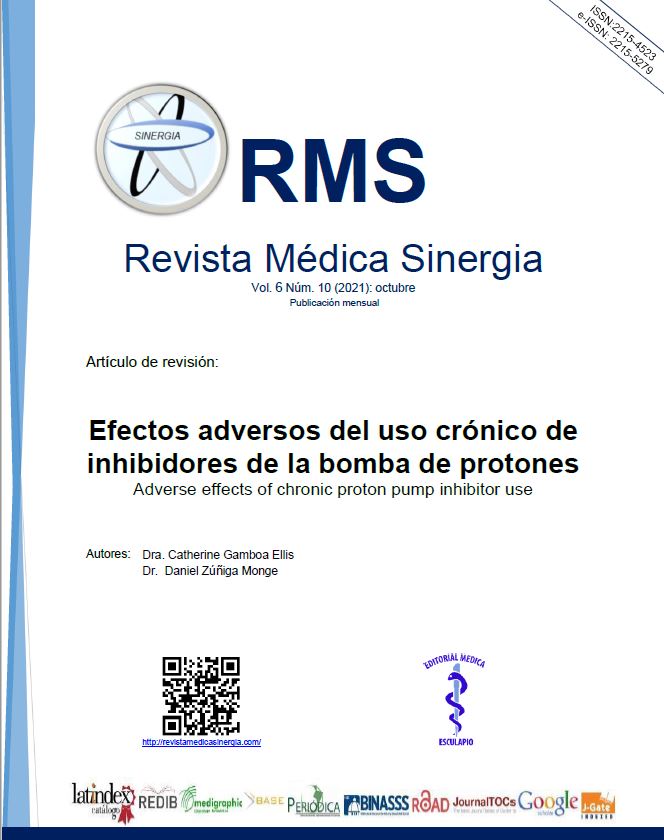Resumen
Los inhibidores de bomba de protones (IBP) son el tratamiento actual más efectivo contra las enfermedades relacionadas con hiperacidez gástrica. Su prescripción ha aumentado de forma exponencial a nivel mundial. En Estados Unidos representan el tercer grupo más utilizado de medicamentos, y desde su introducción en 1989, su uso en adultos se incrementó de un 2.1% a un 4.2% para el 2012. Dicho lo anterior, ha sido de sumo interés en la comunidad científica y la empresa farmacológica investigar y plantear hipótesis acerca de los posibles efectos adversos que se presentan por el uso desmedido y a largo plazo de este grupo de fármacos. Algunos son sustentados por la literatura, sin embargo, otros son sólo “falsas alarmas”.
Palabras clave
Citas
Katzung, BG. Basic and clinical pharmacology, 9th edition. New York: Lange Medical Books; 2004.
Spechler, Stuart Jon. Proton Pump Inhibitors What the Internist Needs to Know Med Clin N Am 103 (2019) 1–14.
Vaezi MF, Yang YX, Howden CW. Complications of proton pump inhibitor therapy. Gastroenterology 2017; 153:35–48.
Blank ML, Parkin L, Paul C, Herbison P. A nation- wide nested case-control study indicates an increased risk of acute interstitial nephritis with proton pump inhibitor use. Kidney Int. 2014;86(4):837–44.
A. Corsonello, F. Lattanzio. Cardiovascular and non cardiovascular concerns in proton pump inhibitor use. Are they safe?. Trends in Cardiovascular Medicine 29 (2019) 353–360.
Martí-Cabrera, Miguel; Martí-Masanet, Miguel; Esplugues Juan. ¿Es real el riesgo de osteoporosis y riesgo de fracturas con el uso crónico de inhibidores de la bomba de protones?. Gastroenterol Hepatol. 2011;34(4):271—277.
B. Haenisch, K. von Holt, B. Wiese et al., “Risk of dementia in elderly patients with the use of proton pump inhibitors,” .European Archives of Psychiatry and Clinical Neuroscience, vol. 265, no. 5, pp. 419–428, 2015.
S.-Y. Tai, C.-Y. Chien, D.-C. Wu et al., Risk of dementia from proton pump inhibitor use in Asian population: a nationwide cohort study in Taiwan. PLoS One, vol. 12, no. 2, article e0171006, 2017.
Freedberg, Daniel; Kim, Lawrence; Yang, Yu-Xiao.The Risks and Benefits of Long-term Use of Proton Pump Inhibitors: Expert Review and Best Practice Advice From the American Gastroenterological Association Gastroenterology. 2017;152:706–715
Xie Y, Bowe B, Li T, Xian H, Balasubramanian S, Al-Aly Z. Proton pump inhibitors and risk of incident CKD and progression to ESRD. J Am SocNephrol 2016; 27(10):3153–3163.
Corsonello, Andrea; Lattanzio, Fabrizia. Cardiovascular and non cardiovascular concerns with proton pump inhibitors: Are they safe?. Trends in Cardiovascular Medicine 29 (2019) 353–360.
Brisebois et al. Risks of Proton Pump Inhibitors .Laryngoscope Investigative Otolaryngology 3: December 2018.
Hauben M, Horn S, Reich L, Younus M. Association between gastric acid suppressants and Clostridium difficilecolitis and community-acquired pneumonia: analysis using pharmacovigilance tools. Int J Infect Dis 2007; 11: 417-422.
Yamamoto Kenta et al. Influence of proton pump inhibitors on microbiota in chronic liver disease patients. Hepatology International (2019) 13:234–244.
Kieboom BCT, Kiefte-de Jong JC, Eijgelsheim M, et al. Proton Pump Inhibitors and Hypomagnesemia in the General Population: A Population-Based Cohort Study. Am J Kidney Dis. 2015; 66(5):775–782.
Hung, Tsung Hsing et al. Effect of proton pump inhibitors in hospitalization on mortality of patients with hepatic encephalopathy and cirrhosis but no active gastrointestinal bleeding. Clinics and Research in Hepatology and Gastroenterology (2018) 42, 353—359.
Thomson Alan et al. Safety of the long term use of protin pump inhibitors. World J Gastroenterol 2010 May 21; 16(19): 2323-2330.
Brusselaers N, Wahlin K, Engstrand L, Lagergren J: Maintenance therapy with pro- ton pump inhibitors and risk of gastric cancer: a nationwide population-based cohort study in Sweden. BMJ Open 2017;7: e017739.
Courley A. Douglas. Safety and Complications of Long-Term Proton Pump Inhibitor Therapy: Getting Closer to the Truth. 2019. AGA. Editorials.
Moayyedi P, Eikelboom JW, Bosch J, et al. Safety of proton pump inhibitors based on a large, multi-year, randomized trial of patients receiving rivaroxaban or aspirin. Gastroenterology 2019;157:682–691.
Attwood SE, Ell C, Galmiche JP, et al. Long-term safety of proton pump inhibitor therapy assessed under controlled, randomised clinical trial conditions: data from the SOPRAN and LOTUS studies. Aliment Pharmacol Ther 2015;41:1162–1174.

Esta obra está bajo una licencia internacional Creative Commons Atribución-NoComercial 4.0.
Derechos de autor 2021 Array


